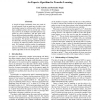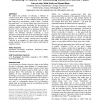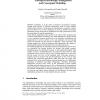1634 search results - page 108 / 327 » Reasoning about Knowledge Using Rough Sets |
STOC
2005
ACM
14 years 10 months ago
2005
ACM
Set agreement, where processors decisions constitute a set of outputs, is notoriously harder to analyze than consensus where the decisions are restricted to a single output. This ...
IJCAI
2007
13 years 11 months ago
2007
A long-lived agent continually faces new tasks in its environment. Such an agent may be able to use knowledge learned in solving earlier tasks to produce candidate policies for it...
ICPP
2008
IEEE
14 years 4 months ago
2008
IEEE
Abstract— We examine the problem of parallelizing the inferencing process for OWL knowledge-bases. A key challenge in this problem is partitioning the computational workload of t...
CHI
2006
ACM
14 years 10 months ago
2006
ACM
We address the problem of collecting a database of "common-sense facts" using a computer game. Informally, a common-sense fact is a true statement about the world that i...
ER
1997
Springer
14 years 2 months ago
1997
Springer
Turbulence is in the nature of business environments. Changes brought about because of different requirements such as social, political, technical and economic, exert pressures on ...



